
What tea is good for hormonal balance?
Spearmint, hibiscus, and ginger teas are excellent choices. These teas are known for their health benefits, including supporting hormonal health and relieving menstrual and menopausal symptoms.
ABOUT ME
Be beauty. Be plant-based!
As a former Registered Nurse and avid plant-muncher, I’m in love with how simple plant-based foods make it easy to be beautiful.

You’ll also love:
Do Fibroids Cause Acne? Pimples, Hormones and Your Uterus
Navigating the world of health and beauty can be a complex journey, especially when it comes to finding natural solutions for maintaining hormonal balance. As you turn to a natural way to support your wellbeing, understanding what tea is good for hormonal balance becomes an essential for a simple action that fits easily into daily life. From the refreshing green tea to the nurturing red raspberry leaf tea, each brew offers unique benefits, acting as a hormonal balance tea in its own right. This post delves into a variety of teas that can promote your hormonal health.
6 Teas for Hormonal Balance
Spearmint Tea: A Fresh and Aromatic Choice
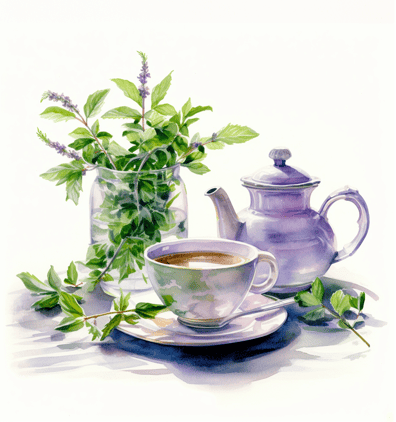
Spearmint tea is more than just a refreshing drink. Its potential to assist women, particularly those dealing with PCOS, makes it a standout choice. By influencing levels of hormones, spearmint tea addresses issues like excessive hair growth and hormonal acne, making it a valuable addition to a women’s health regimen.
Taste: Spearmint tea is known for its refreshing, slightly sweet, and cool minty flavour. It’s often enjoyed for its light and invigorating taste.
Availability: Widely available in tea bags, it can also be brewed fresh using spearmint leaves.
Hibiscus Tea: The Vibrant and Tangy Brew
The vibrant Hibiscus tea is not just a feast for the eyes. Its rich antioxidant properties and high vitamin C content make it a powerhouse for combating free radicals and oxidative stress. Women seeking to manage their hormonal fluctuations can find solace in a cup of this delightful tea.
Taste: Hibiscus tea boasts a tart, cranberry-like flavour, often described as zesty and fruity. Its deep red colour makes it visually appealing.
Availability: Commonly found in tea bags and loose-leaf form, hibiscus can also be brewed from the dried petals of the hibiscus flower.
Ginger Tea: Spicy and Warming Comfort
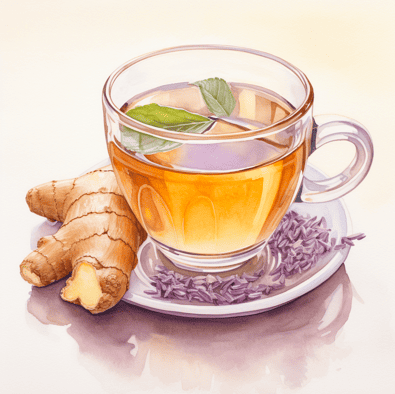
When it comes to tackling premenstrual syndrome and menstrual cramps, ginger tea emerges as a formidable ally. Its warming nature and anti-inflammatory qualities offer comfort during those challenging days each month.
Taste: Ginger tea has a distinctively spicy and warm taste, with a bit of a kick. It can be sweetened to balance its strong, pungent flavour.
Availability: Available in tea bags, as well as fresh, which can be sliced or grated directly into boiling water for a more potent brew.
You’ll also love:
Herbs for Hormonal Acne: Transform Your Skin
Holy Basil (Tulsi): The Herb with a Sacred Touch
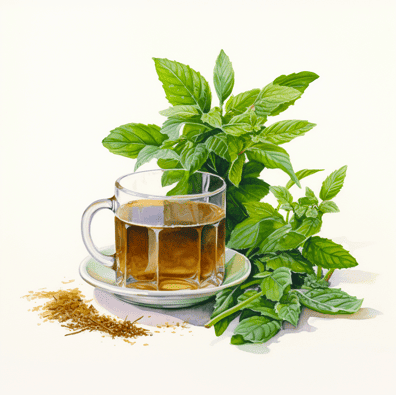
The holy grail of stress relief, Holy Basil (Tulsi), plays a pivotal role in managing cortisol levels. This adaptogenic herb not only aids in stress management but also supports overall hormonal balance, making it a must-have for anyone looking to harmonise their body’s internal environment.
Taste: Holy Basil tea offers a unique combination of flavours – slightly spicy, peppery, with a hint of clove. It’s both refreshing and soothing.
Availability: Tulsi tea is available in tea bags, and the leaves can be used fresh or dried for brewing.
Shatavari: The Subtle and Nurturing Herb
A hidden gem in the realm of Ayurvedic medicine, Shatavari, supports the female reproductive system in a profound way. This herb, revered for its nurturing properties, offers holistic support, especially during transitions like menopause and periods of hormonal imbalance.
Taste: Shatavari tea has a mildly sweet and slightly bitter flavour. It’s often described as earthy and grounding.
Availability: Typically found in powdered form, it can be mixed into hot water or added to tea blends. It may not be as readily available in conventional tea bag form.
Red Raspberry Leaf Tea: The Gentle Herbal Remedy
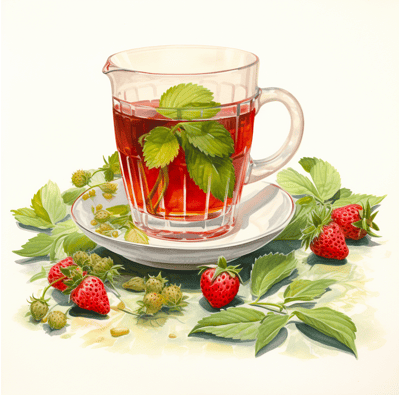
Lastly, the esteemed Red Raspberry Leaf Tea stands out as a quintessential fertility tea and an organic tea formula. Known for its ability to nurture the female body, it provides comprehensive support for various aspects of reproductive health.
Taste: Red raspberry leaf tea has a flavour similar to black tea, though it’s caffeine-free. It’s subtly astringent with a gentle, herbal undertone.
Availability: Commonly found in tea bags and loose-leaf form, it can be brewed much like traditional tea.
Each of these teas offers a unique taste experience, along with its beneficial properties for hormonal balance. Whether you prefer the zing of ginger or the refreshing touch of spearmint, there’s a variety to suit every palate. These teas can be a delightful addition to your daily routine, providing both flavour and wellness benefits.
Additional Teas
Black Cohosh: The Menopausal Ally
Benefits: Black Cohosh is widely recognised for its effectiveness in reducing menopausal symptoms like hot flashes, night sweats, and mood swings. It’s believed to work by influencing oestrogen levels, although its exact mechanism is still being studied.
Taste: Slightly bitter and earthy, with a woody hint of sweetness.
Availability: Available in tea bags, capsules, and tinctures, it can be brewed from the dried root.
Lady’s Mantle: A Gentle Herbal Tea
Benefits: Lady’s Mantle is often used to tame heavy periods or excessive bleeding and is thought to have a soothing effect on the female reproductive system. It’s also considered helpful for hormonal fluctuations during the menstrual cycle.
Taste: Mild, grassy flavour with a subtle hint of bitterness.
Availability: Mainly in loose-leaf form, brewed from dried leaves and flowers.
Red Clover: The Phytoestrogen-Rich Brew
Benefits: Red Clover contains phytoestrogens, which are believed to help balance hormone levels, particularly oestrogen levels. It’s often used to alleviate menopausal symptoms and support reproductive health.
Taste: Mild, sweet, slightly grassy with a floral undertone.
Availability: In both tea bags and loose-leaf formats, brewed from dried flowers.
Ginkgo Biloba: The Ancient Tea for Modern Times
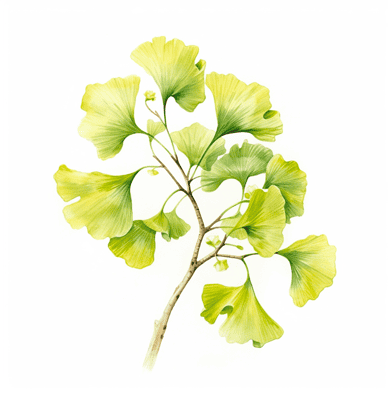
Benefits: Ginkgo Biloba is reputed for its potential to improve PMS symptoms and mood fluctuations. It’s believed to have a positive effect on the nervous system and hormonal health.
Taste: Somewhat earthy with a slightly bitter aftertaste, similar to green tea.
Availability: In tea bags and as loose leaves, also common in supplements and extracts.
Yarrow: The Versatile Herbal Remedy
Benefits: Yarrow is known for its beneficial effects on menstrual cramps and regulating menstrual flow. It’s believed to act as a tonic for the female reproductive system and may help balance hormone levels.
Taste: Bitter, with a complex profile including slight astringency and sweetness.
Availability: In both tea bag and loose-leaf forms, and can be harvested fresh.
Motherwort: The Heart-Opening Herbal Tea
Benefits: Motherwort is traditionally used to stimulate menstruation and stabilise hormones like oestrogen and progesterone. It’s also known for its calming effects, particularly during menopausal transitions.
Taste: Strong, bitter taste with a slightly pungent flavour.
Availability: Typically in loose-leaf form or as a tincture. Not commonly available in tea bags.
Each of these teas offers unique benefits for women’s health, particularly in relation to hormonal balance and the challenges of different life stages. They provide natural support for various conditions and symptoms, making them valuable additions to a holistic health approach.
Teas with Limited Scientific Backing
Green Tea/Matcha: The Antioxidant Powerhouse

Benefits: Green tea and matcha are lauded for their high antioxidant content, believed to combat free radicals and oxidative stress. While they’re known for general health benefits, their direct impact on hormonal balance is less established. Some suggest they may aid in regulating blood sugar levels and insulin sensitivity, which can indirectly affect hormones.
Taste: Green tea offers a fresh, slightly bitter, and astringent flavour, while matcha is richer and more umami.
Availability: Widely available in tea bags, loose leaves, and powder form for matcha.
Dandelion Root: The Earthy Detoxifier
Benefits: Dandelion root is reputed for its liver support, crucial for hormone metabolism. Its role in hormonal balance centres around its detoxifying properties, although direct effects on hormones like oestrogen or progesterone are less documented.
Taste: Robust, earthy, and slightly bitter, akin to coffee.
Availability: Found in tea bags and as loose roots, suitable for brewing like tea or coffee.
Burdock Root: The Sweet and Woody Brew
Benefits: Burdock root is traditionally used for blood purification and digestive health. It’s thought to help with hormonal balance by aiding overall detoxification. However, the scientific evidence specifically linking burdock root to hormone regulation is sparse.
Taste: Mildly sweet, earthy flavour with woody notes.
Availability: Available in tea bags and loose root form for brewing.
Vitex/Chaste Berry: The Herbal Hormone Regulator
Benefits: Vitex is commonly recommended for menstrual irregularities and PMS symptoms, thought to regulate the pituitary gland and subsequently, hormonal release. However, more comprehensive research is needed to validate these claims fully.
Taste: Slightly peppery and bitter.
Availability: Primarily found in capsule and tincture forms, but also available as loose berries or in tea bags.
While these teas are popular in holistic health practices, it’s important to approach their use with a balanced perspective, recognising that scientific support for their effects on hormonal balance varies. Always consider consulting a healthcare professional for personalised advice, especially when dealing with specific hormonal issues.
What tea is good for hormonal balance?
In exploring teas for hormonal balance, we’ve discovered a variety of options, from the calming spearmint tea to the antioxidant-rich green tea. These teas, while beneficial, are part of a larger lifestyle approach that includes a balanced diet, regular exercise, and stress management. They offer a natural way to support hormonal health, complementing other healthy habits. Embrace these teas not just for their flavours but for their role in your overall wellness journey, whether you’re navigating PMS symptoms, menopausal changes, or simply striving for better health. After all, finding what tea is good for hormonal balance is about tuning in to your body’s needs and finding joy in the remedies nature has to offer.